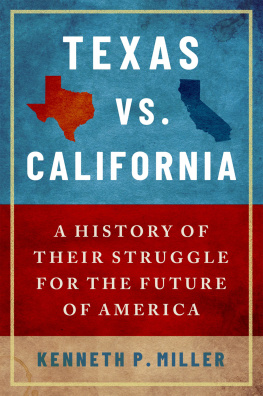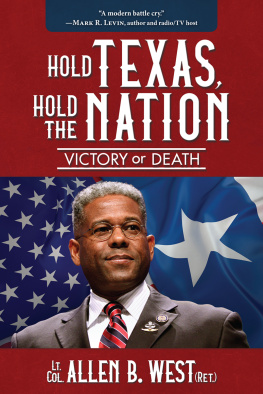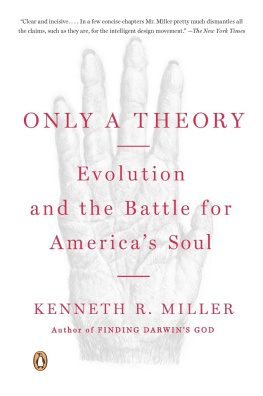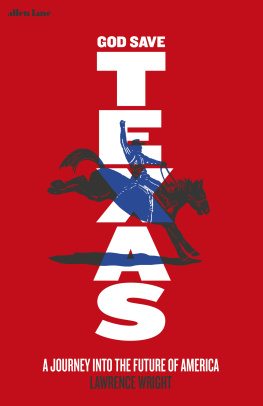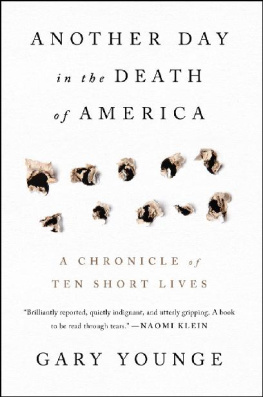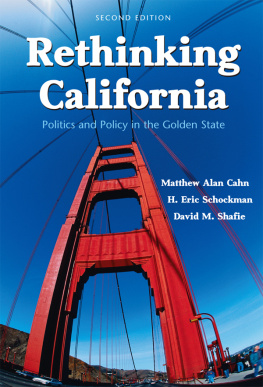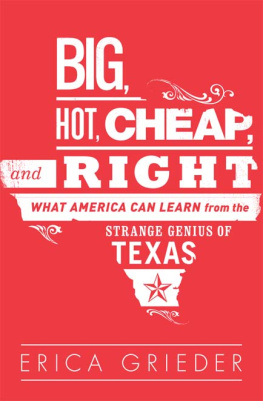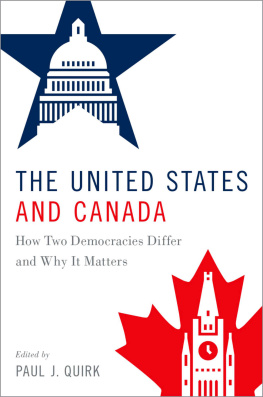Texas vs. California

Oxford University Press is a department of the University of Oxford. It furthers the Universitys objective of excellence in research, scholarship, and education by publishing worldwide. Oxford is a registered trade mark of Oxford University Press in the UK and certain other countries.
Published in the United States of America by Oxford University Press
198 Madison Avenue, New York, NY 10016, United States of America.
Oxford University Press 2020
All rights reserved. No part of this publication may be reproduced, stored in a retrieval system, or transmitted, in any form or by any means, without the prior permission in writing of Oxford University Press, or as expressly permitted by law, by license, or under terms agreed with the appropriate reproduction rights organization. Inquiries concerning reproduction outside the scope of the above should be sent to the Rights Department, Oxford University Press, at the address above.
You must not circulate this work in any other form and you must impose this same condition on any acquirer.
Library of Congress Cataloging-in-Publication Data
Names: Miller, Kenneth P. (Political scientist), author.
Title: Texas vs. California : a history of their struggle for the future of
America / [Kenneth P. Miller].
Description: New York, NY : Oxford University Press, [2020] |
Includes bibliographical references and index.
Identifiers: LCCN 2020006848 (print) | LCCN 2020006849 (ebook) |
ISBN 9780190077365 (hardback) | ISBN 9780190077372 (paperback) |
ISBN 9780190077396 (epub) | ISBN 9780190077402 (online)
Subjects: LCSH: Political cultureUnited States. |
Right and left (Political science)United States. | Polarization (Social sciences)United States. |
Comparative government. | TexasPolitics and government. |
CaliforniaPolitics and government.
Classification: LCC JK4816 .M55 2007 (print) | LCC JK4816 (ebook) |
DDC 306.20973dc23
LC record available at https://lccn.loc.gov/2020006848
LC ebook record available at https://lccn.loc.gov/2020006849
To Kimberly June Miller,
who introduced me to Texas,
and
to Jenna June Miller,
a new Californian
Contents
I did not plan to write a preface for this book. Authors often use a preface to introduce readers to their books themes or to place those themes in context. When considering whether to include one here, I knew that many readers already would be familiar with the partisan division between red and blue America and the rivalry between Texas and California. I thought we could dive in without any introduction.
But as I was finishing this manuscript in early 2020, the Coronavirus Disease 2019 (COVID-19) pandemic spread across the globe and reached the United States, carrying with it a grim threat to public health and to normal social and economic life.
Governors and local officials across the country sought to contain the virus by ordering people to stay home and businesses to close their doors. As everyday activities ground to a halt, markets tumbled and millions lost their jobs. To prevent a further collapse, the federal government sent trillions of dollars of relief to businesses, individuals, and state and local governments. As part of the shutdown, officials postponed elections and curtailed civil liberties.
It was unclear how long the health emergency would last, how far the economy would fall, how much the federal money would help, and how effectively the political system would adapt. Under almost any scenario, the pandemics damage would be felt for years to come.
The weight of these events convinced me I should say a few words about how the themes in these pages speak to our new, uncertain future.
This book argues that understanding our past helps us see more clearly both our current situation and that which lies ahead. With this perspective, the book follows Texas and California from their origins to the present to explore how they have emerged as leaders of red and blue America, developed contrasting policy agendas, and competed within the federal system. The analysis culminates in the first two decades of the twenty-first century, when the nation more fully polarized and the two states honed their competing policy models.
During these years, and especially after the Great Recession of 20072009, both Texas and California flourished. As the book describes, they pursued radically different priorities and struggled with varying challenges, but both could boast successes, including growing economies and budget surpluses.
The Great Disruption of 2020 has closed that chapter. By abruptly halting the nations longest-running economic expansion, the virus has forced Texas and Californialike all statesto adjust to deeply diminished circumstances. Both models now will undergo a severe stress test. How will each respond as demands for public services surge while tax revenues crater? What will their key industries do to recover from financial collapse? How will voters react to the crisis? And, finally, will the familiar pre-2020 features of American politicsthe partisan polarization, red-blue state divide, and Texas-California rivalrysurvive this disruption?
Previous crises offer contrasting analogies. In the early 1930s, the Great Depression instigated a massive political realignment that made Democrats the nations majority party and ushered in fundamental policy changes. By comparison, however, the Great Recession of 20072009 helped elect Barack Obama to the White House, but had little lasting effect on the nations partisan balance or policy direction.
In truth, the crisis of 2020 has no clear precedent. Although this disruption will undoubtedly change American society in many ways, at this writing no one can be certain whether it will fundamentally alter the nations political or policy orientation.
Many have expressed hope that living through this emergency will cause Americans to reset and break free from their entrenched polarization. This book makes the case that we should all approach our differences with greater appreciation and respect for those on the other side, and I certainly hope this experience will spur more of us to do so. But it is probably unrealistic to expect that the pandemic will produce a new national consensus. It is more likely that the profound economic, cultural, and political differences discussed in this book will shape the national debate about how to move forward from this crisis. Similarly, we can expect Texas and California to continue to offer competing visions as theyand the nation as a wholenavigate the uncharted territory ahead.
In that sense, this entire book is a preface to the story of what comes next in the struggle for the nations future.
K.P.M.
Claremont, California, May 2020
A confluence of life experiences inspired me to write this book. I am a native Californian, part of the fifth generation of my family to live in the Golden State. My ancestors were drawn to California by its world-class climate, natural beauty, and boundless opportunities; like they, I developed an abiding love for this special place. I also was drawn to its politics. I worked for a time in the state capitol and, later, made California politics my academic specialization.
My interest in Texas came later. About a decade ago, I met an extraordinary native Texan named Kimberly. When she and I married, I joined a family with deep roots in the Lone Star State. Her parents and entire family welcomed me with open arms and treated me like an honorary Texan. At the time, the rivalry between Texas and California was heating up. As I spent time in both states, I was struck by their similarities as well as their profound differences. The ideas for this book began to take form.

